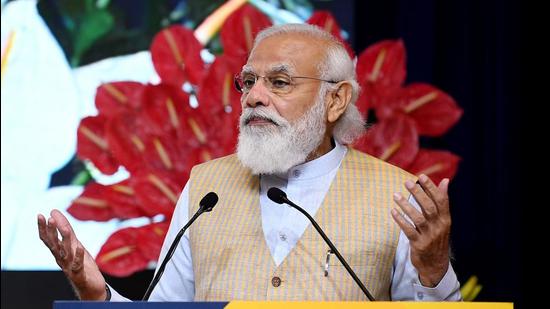PM Narendra Modi launches second phase of Swachh Bharat mission
In his speech, the PM Modi mentioned how India has come a long way from processing of barely 20% of its daily waste before 2014 to about 70% at present
Prime Minister Narendra Modi launched the second phases of the flagship Swachh Bharat mission and the Atal Mission for Rejuvenation and Urban Transformation or AMRUT on Friday, saying the schemes were aimed at making Indian cities entirely garbage-free and water-secure and ensuring that no sewage pipes drain into the rivers.

In his speech, the PM mentioned how India has come a long way from processing of barely 20% of its daily waste before 2014 to about 70% at present, but added that 100% garbage would be processed to create “wealth from waste” and improve standards of living. The total outlay of the two projects was about ₹4.4 lakh crores.
“We have to remember that maintaining cleanliness is not just for a day, a fortnight, a year or for a few people, it is a mega campaign for every day, every fortnight, every year, for everyone and a continuous programme from one generation to another,” the PM said.
In its second phase, Swachh Bharat will focus on foolproof waste management while AMRUT will focus on enhancing sewerage and septic management and to make all Indian cities water secure. In the second phase, all statutory towns will become at least ODF+ and all cities with less than 1 lakh population would be ODF++, as per the sanitation protocols set by the urban development ministry.
The Amrut 2.0 will extends coverage from 500 cities under the first phase to 4,700 cities and towns and provide water tap connections to 26.8 million urban households. The Swachh Bharat Mission will focus on completing liquid waste management in cities with less than 100,000 population and process to remove all legacy dump sites.
The government said 4,798 municipal bodies have already signed a memorandum of understanding with the Centre.
Additionally, around 350,000 individual, community and public toilets will be constructed.
Modi, who took a personal interest in making the Swachh Bharat mission a success, said, “If we look at seven years before 2014, only ₹1.25 lakh crore was allotted for urban development. Under our government, we have allotted nearly ₹4 lakh crore for urban development. This investment has been done on cleanliness, waste management and new sewage treatment plants,”
Modi dedicated the schemes a tribute to Mahatma Gandhi, whose 152nd birth anniversary will be celebrated on Saturday, and said, “The journey of Swachh Bharat Abhiyan and AMRUT Mission has instilled pride in every countryman.” proud. He hailed the missions for encapsulating respect, dignity, the people’s ambition and the “unmatched love for the motherland”.
The PM said that toilet facilities brought about social changes. “Earlier, many women couldn’t go to work and many girls opted out of the school in the absence of toilets,” he added, noting that not just personal hygiene but social hygiene had also changed, highlighting the example of the Indian Railways.
Union ministers Hardeep Singh Puri, Gajendra Singh Shekhawat, Prahlad Singh Patel, Kaushal Kishore, Bishweswar Tudu and ministers from states were present on the occasion.
Modi also underlined that the venue, the Ambedkar International Centre, assumes significance as “Babasaheb believed in urban development as a great means of removing inequality.”
“Many people from villages come to cities with an aspiration for a better life. They get employment but their standard of living remains in a difficult situation even compared to their lives in the villages. This is like double jeopardy of staying away from home, and after that to stay in such a difficult situation,” the PM added.
He once again relied on people’s participation to make the schemes successful and said, “Sabka Saath, Sabka Vikas and Sabka Vishwas, Sabka Prayas is critical” for the next phase of cleanliness.”






